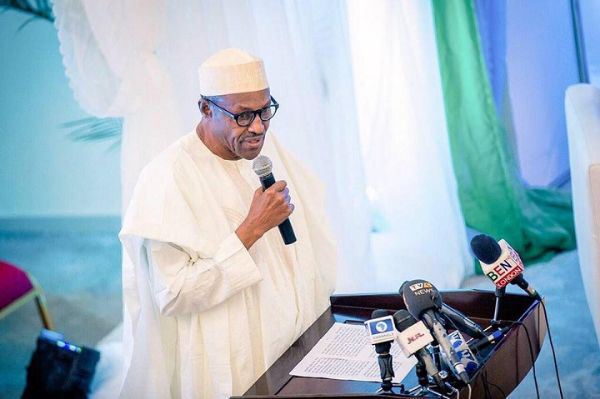President MuhammaduBuhari yesterdayunveileda budget proposal ofN6.081trn, which hechristened “Budget ofChange”, for the 2016 fiscalyear.
Accompanied by theVice President, Prof. YemiOsibanjo, and membersof the Federal ExecutiveCouncil, FEC, NationalChairman of the All ProgressivesCongress, APC,Chief John Oyegun andmembers of the national working committee of the party, the President arrived the National Assembly at exactly 10.00 a.m. for the budget presentation before the joint session of the two chambers of the National Assembly.
Clad in a white agbada and white cap to match, the President was accompanied by and received by Deputy Senate President, Ike Ekweremadu, Deputy Speaker, House of Representatives, Yusuf Lasun and the Clerk to the National Assembly, Alhaji Salisu Maikasuwa.
The President was greeted by a cheering staff of the National Assembly with shouts of Sai Baba! Sai Baba!
A breakdown of the budget showed that Works, Housing, Power, Transport, Education, Defence, Interior, Special intervention program received the highest allocations.
The President announced increment of the capital expenditure portion of the budget from N557bn this to N1.8trn in 2016 to enable the administration deliver on its capital development programmes.
“Capital expenditure will represent 30 per cent of our total budget. In future years we intend to raise the percentage allocation for capital expenditure.
“This increased capital expenditure commits significant resources to critical sectors such as Works, Power and Housing – N433.4bn; Transport – N202bn; Special Intervention Programs – N200bn; Defence – N134.6bn; and Interior – N53.1bn.
“Indeed, the future looks bright. And I ask that we all work together to make this vision a reality. The 223 per cent year on year growth in capital expenditure demonstrates our desire to make Nigeria more competitive, and start the journey to deliver sustainable development in our country.
“In fulfillment of our promise to run a lean government, we have proposed a 9 per cent reduction in non-debt recurrent expenditure, from N2.59trn in the 2015 budget to N2.35trn in 2016.
“Furthermore, we have budgeted N300bn for Special Intervention Programs, which takes the total amount for non-debt recurrent expenditure to N2.65trn,” the President said.
Buhari stated that his administration would devote a significant portion of the recurrent expenditure to institutions that provide critical government services.
In this regard, he said his government would spend N369.6bn on education; N294.5bn on defence; N221.7bn in the health sector and N145.3bn in the Ministry of Interior.
According to him, the allocation would ensure that teachers, armed forces personnel, doctors, nurses, policemen, fire fighters, prison service officers and many more critical service providers are paid competitively and on time.
He said N113bn would be set aside for a Sinking Fund towards the retirement of maturing loans; while N1.36trn has been provided for foreign and domestic debt service.
The president expressed concern over the difficulties Nigerians go through to secure foreign exchange to transact businesses.
He said the problems were clearly due to the current inadequacies in the supply of foreign exchange to Nigerians who need it.
The President said he had been assured that the Central Bank is currently fine-tuning its foreign exchange management to introduce some flexibility and encourage additional inflow of foreign currency to help ease the pressure.
He also used the occasion of the presentation to urge Nigerians to believe in the country and to renew hopes that the future remains bright, even in the face of apparent dismay.
He said: “Fellow Nigerians, the confidence of many might be shaken. However, I stand before you today promising that we will secure our country, rebuild our economy, and make the Federal Republic of Nigeria stronger than it has ever been.”
The President said the answers to the country’s problems were not beyond the country, stressing that “they exist on our farmlands; our corporations; in the universities, in the hearts and minds of our entrepreneurs; through the gallantry of our Armed Forces; and the resolute spirit of Nigerians, especially the youth, who have refused to give up despite all the obstacles confronting them.”
He added that the budget represents a major step in delivering a new opportunity for Nigeria.
“It demonstrates our confident optimism that despite the challenging times, we have the will, resourcefulness and commitment to deliver prosperity to our people. And by the Grace of Almighty God and the sheer will and determination of the Nigerian people, we will come out stronger and more united than ever,” he added.
He said the budget proposal, the first by his government, sought to stimulate the economy, making it more competitive by focusing on infrastructure development; delivering inclusive growth; and prioritising the welfare of Nigerians.
The President reiterated his belief that the budget, while helping industry, commerce and investment to pick up, will as a matter of urgency, address the immediate problems of youth unemployment and the terrible living conditions of the extremely poor and vulnerable citizens.
He stressed that the state of the nation’s economy, which is further worsened by the unbridled corruption and security challenges that have faced it in the last few years, remained a source of concern for many.
“From those who have lost their jobs, to those young people who have never had a job, to the people in the North East whose families and businesses were destroyed by insurgents, this has been a difficult period in our nation’s history, lessons that we must not forget or ignore, as we plan for the future,” Buhari said.
He also seized the moment to reiterate his administration’s resolve to go after all those who have looted the wealth of the country no matter how well placed they are in the country.
“We have demonstrated a strong will to fight corruption. I am sure you will agree that the sheer scale of corruption and impunity of the past explains in part, the economic challenges we now face.
“On these initiatives, and the many more to come, we shall not be deterred. We will pursue the recovery of everything that belongs to the people of Nigeria. No matter where it is hidden. No matter how long it will take,” the President vowed.
On the issue of unemployment, Buhari stated that his administration would in the interim create employment for 500,000 teachers.
He said: “As an emergency measure, to address the chronic shortage of teachers in public schools across the country, we also will partner with state and local governments to recruit, train and deploy 500,000 unemployed graduates and NCE holders.
“These graduate teachers will be deployed to primary schools, thereby, enhancing the provision of basic education especially in our rural areas.
“We also intend to partner with state and local governments to provide financial training and loans to market women, traders and artisans, through their cooperative societies.
“We believe that this segment of our society is not only critical to our plan for growing small businesses, but it is also an important platform to create jobs and provide opportunities for entrepreneurs.
“Furthermore, through the office of the Vice President, we are working with various development partners to design an implementable and transparent conditional cash transfer program for the poorest and most vulnerable.
“This program will be implemented in phases. Already, the compilation of registers of the poorest persons is ongoing. In the coming weeks, we will present the full programme, which will include our home-grown public primary school feeding and free education for science, technology and education students in our tertiary institutions. Indeed, this will mark a historic milestone for us as a nation.”
While sympathizing with Nigerians over the sufferings necessitated by the current fuel scarcity in the country, Buhari said he was retaining the current petroleum pump price of N87 per litre for now.
Meanwhile, the senate also yesterday after the budget presentation by the President retired into a plenary where they amended the 2015 budget appropriation act to extend the implementation of the capital component of the budget beyond December 31, 2015.
Source: Mirror



